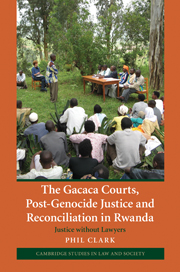Book contents
- Frontmatter
- Contents
- Acknowledgements
- List of abbreviations
- Map of Rwanda
- Introduction
- 1 Framing gacaca: six transitional justice themes
- 2 Moulding tradition: the history, law and hybridity of gacaca
- 3 Interpreting gacaca: the rationale for analysing a dynamic socio-legal institution
- 4 The gacaca journey: the rough road to justice and reconciliation
- 5 Gacaca's modus operandi: engagement through popular participation
- 6 Gacaca's pragmatic objectives
- 7 Accuser, liberator or reconciler?: Truth through gacaca
- 8 Law, order and restoration: peace and justice through gacaca
- 9 Mending hearts and minds: healing and forgiveness through gacaca
- 10 (Re)fusing social bonds: gacaca and reconciliation
- Conclusion
- Glossary
- Bibliography
- Index
6 - Gacaca's pragmatic objectives
Published online by Cambridge University Press: 06 December 2010
- Frontmatter
- Contents
- Acknowledgements
- List of abbreviations
- Map of Rwanda
- Introduction
- 1 Framing gacaca: six transitional justice themes
- 2 Moulding tradition: the history, law and hybridity of gacaca
- 3 Interpreting gacaca: the rationale for analysing a dynamic socio-legal institution
- 4 The gacaca journey: the rough road to justice and reconciliation
- 5 Gacaca's modus operandi: engagement through popular participation
- 6 Gacaca's pragmatic objectives
- 7 Accuser, liberator or reconciler?: Truth through gacaca
- 8 Law, order and restoration: peace and justice through gacaca
- 9 Mending hearts and minds: healing and forgiveness through gacaca
- 10 (Re)fusing social bonds: gacaca and reconciliation
- Conclusion
- Glossary
- Bibliography
- Index
Summary
INTRODUCTION
Part of what makes gacaca such a complex social institution and difficult to interpret is the fact that various sources view it as a response to both pragmatic and more subtle socio-cultural needs in post-genocide Rwanda. Interpreting gacaca entails exploring areas as diverse as people's material well-being and their capacity to rebuild fractured relationships. The Rwandan government faces serious practical difficulties in rebuilding the nation, particularly processing the backlog of cases of genocide suspects and a lack of material resources, which hamper efforts to reduce poverty and to rebuild physical and social infrastructure after the genocide. This chapter focuses on the ways in which gacaca is designed partly as a remedy to some of the state's pragmatic, judicial and economic problems. While gacaca unquestionably has lofty aims concerning reconstructing lives and people's relationships, it is also driven by these sorts of practical dilemmas that confront most post-conflict societies. Chapters 7–10 focus on the contribution of gacaca to the fulfilment of profound objectives, which relate more to the social needs of discrete communities and Rwandan society as a whole. Alongside gacaca's hybrid modalities of creating a public, discursive space within legal boundaries, the remaining chapters highlight gacaca's hybrid objectives, which cover these pragmatic and profound concerns.
This chapter examines three pragmatic objectives to which the government and commentators (and to a lesser extent the population) have linked gacaca: processing the backlog of genocide cases and improving living conditions in the prisons (two objectives that this chapter explores together under the heading of ‘problems concerning overcrowded prisons’); and fostering economic development.
- Type
- Chapter
- Information
- The Gacaca Courts, Post-Genocide Justice and Reconciliation in RwandaJustice without Lawyers, pp. 169 - 185Publisher: Cambridge University PressPrint publication year: 2010
- 2
- Cited by



